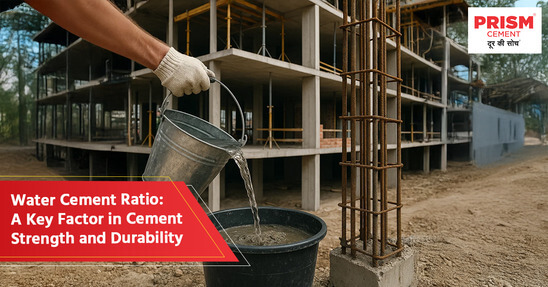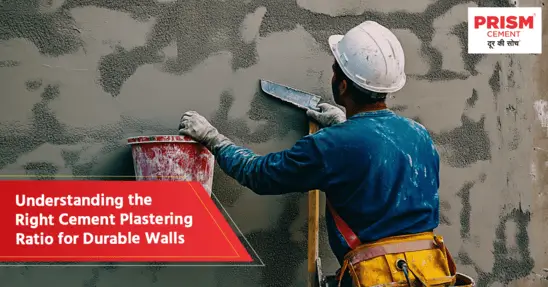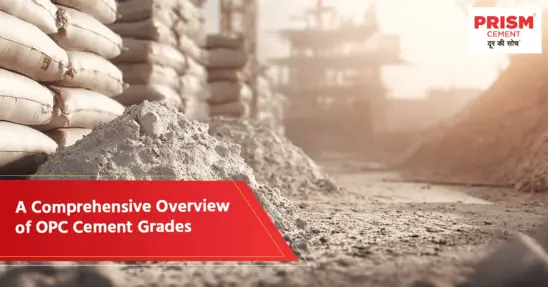When it comes to constructing durable and strong structures, one of the most crucial aspects to consider is the water cement ratio. This simple yet vital factor plays a significant role in determining the strength, durability, and overall performance of concrete. Whether you're a DIY enthusiast or a professional, understanding the cement mix ratio is essential to achieving the best results.
In this blog, we will dive deep into what the water cement ratio is, why it matters, and how to optimize it for better cement strength.
What is Water Cement Ratio?
It refers to the proportion of water used in the concrete mix relative to the amount of cement. This ratio is expressed as a number, which defines the relationship between the weight of water and the weight of cement. The optimum it is, the stronger and more durable the concrete will be, as it minimizes the amount of water that can cause voids in the concrete once it sets.
In simple terms, the cement ratio mix directly influences the concrete's final quality. Too much water weakens the bond between the cement particles, leading to a lower strength of the concrete. On the other hand, too less water can make the concrete difficult to work with, potentially causing poor workability and cracks.
Why is Water Cement Ratio Important in Concrete?
It is one of the key determinants of the strength and durability of concrete. Here's why:
- Cement Strength: Concrete's cement strength is directly impacted by the amount of water in the mix. A higher water content dilutes the mixture, resulting in weaker concrete. Conversely, optimum water increases the bond between the cement particles, leading to stronger concrete.
- Workability: A cement ratio mix that's too low can result in dry, hard concrete that is difficult to mix, place, or finish. When it’s balanced, it ensures that the concrete is workable enough to place and finish while maintaining the desired strength.
- Durability: The proper ratio contributes to concrete's ability to withstand environmental conditions, such as moisture, temperature changes, and stress. Concrete with a low water content tends to be more resistant to water infiltration and cracking.
Ideal Cement Mix Ratios for Different Applications
The ideal cement mix ratio varies depending on the type of project and its specific requirements. Here are a few examples:
- For Foundations: For concrete foundations, the water cement ratio should be between 0.45 to 0.60. This ensures adequate strength and durability to withstand heavy loads and environmental stress.
- For Slabs: For floor slabs, a cement ratio mix of around 1:2:4 (cement: sand: aggregate) with a water cement ratio of 0.4 to 0.5 is ideal. This mix provides good workability while maintaining the required strength.
- For Walls: Concrete for walls should have a water cement ratio of approximately 0.4 to 0.5 to ensure a balance of strength and ease of application.
- For High Strength Concrete: In applications that require high-strength concrete, such as high-rise buildings or bridges, the cement mix ratio may be more refined, often closer to 1:1.5:3, with a water cement ratio as low as 0.35 to 0.4.
Factors Affecting the Ideal Water Cement Ratio
Several factors influence it and its impact on concrete quality:
- Cement Type: Different types of cement react differently to water. For instance, Prism Champion Duratech cement, known for its durability and high strength, may require a slightly different water cement ratio compared to regular cement for optimal performance.
- Environmental Conditions: Hot or dry weather can lead to faster evaporation of water, requiring a slightly higher cement ratio mix to maintain workability. On the other hand, high humidity might necessitate a lower ratio to prevent over-saturation of the mix.
- Aggregate Size and Type: The size and type of aggregates used can influence the water demand in the mix. Larger aggregates generally require less water than finer ones.
- Desired Concrete Strength: If you require higher-strength concrete for structural integrity, you should aim for a lower ratio, while ensuring the mix remains workable.
Tips to Maintain an Effective Water Cement Ratio
To maintain an effective ratio, consider the following tips:
- Accurate Measurement: Use precise measurements for water and cement to maintain consistency in the mix. Even small deviations can significantly affect the final strength of the concrete.
- Use a Water-Reducing Admixture: If you need to reduce the water cement ratio but still want to maintain workability, consider using a water-reducing admixture, which helps to improve the mix’s performance.
- Test the Mix: Before starting large-scale mixing, test a small batch of the cement mix ratio to ensure the desired strength and workability.
- Proper Mixing: Ensure the cement mix ratio is thoroughly mixed to achieve uniform distribution of cement, water, and aggregates. This will ensure consistent strength throughout the concrete.
Common Mistakes to Avoid
- Excess Water: Adding too much water dilutes the mixture, leading to weaker concrete and reducing durability. Always maintain the recommended water cement ratio.
- Ignoring Environmental Conditions: Neglecting to adjust the cement mix ratio for environmental factors such as humidity or temperature can lead to issues like cracking or improper curing.
- Using Poor Quality Cement: Always use high-quality cement, which ensure the strength and durability of your concrete. Low-quality cement can weaken the bond and reduce concrete strength.
Best Practices for Achieving Optimal Water Cement Ratio
To achieve the best cement strength and durability, follow these best practices:
- Use the Right Cement: Choose high-quality cement such as Prism Champion All Weather Cement, known for its superior strength and resistance to water seepage. This ensures that the cement ratio mix you use will result in durable and long-lasting concrete.
- Adhere to Guidelines: Always adhere to recommended cement ratio mix and water cement ratio guidelines for each specific application.
- Monitor Curing: Proper curing ensures that the concrete reaches its full strength. Maintain an ideal moisture level during the curing process.
- Use Fresh Materials: Ensure that the water and aggregates used are of good quality and fresh, as using stale or contaminated materials can adversely affect the cement mix ratio and the final product.
Conclusion
In conclusion, the water-cement ratio is one of the most critical factors in determining the strength and durability of concrete. By understanding and maintaining the proper cement ratio mix, you can ensure that your concrete structure is strong, durable, and long-lasting. For optimal results, always choose high-quality cement such as Prism Champion All Weather Cement, which enhances the performance of your mix and provides additional resistance to moisture and cracking. A well-maintained ratio will go a long way in ensuring your construction project stands the test of time.
Achieve stronger, more durable concrete by optimizing your water-cement ratio. Use our guide to mix your cement for the best results!
FAQ Section
Q1. What is the ideal water cement ratio for strong concrete?
Answer: The ideal ratio for strong concrete typically falls between 0.4 to 0.5, depending on the application and environmental conditions.
Q2. What is the ideal water cement ratio for achieving maximum cement strength?
Answer: For maximum cement strength, a lower ratio of around 0.35 to 0.4 is recommended.
Q3. How does the cement mix ratio affect concrete performance?
Answer: The cement mix ratio determines the concrete's strength, workability, and durability. A balanced mix ensures that the concrete achieves the desired properties.
Q4. What is the standard cement ratio for house construction?
Answer: For house construction, the standard cement ratio mix is typically 1:2:4 (cement: sand: aggregate) with a water cement ratio of 0.45 to 0.60.
Q5. Can too much water in the mix weaken cement strength?
Answer: Yes, too much water dilutes the cement particles, leading to voids in the concrete, which weakens its strength and reduces its durability.




